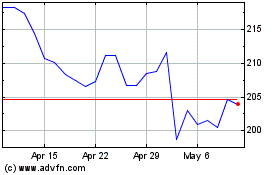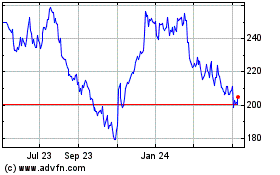Teleflex Incorporated (NYSE: TFX), a leading global provider of
medical technologies, today announced the publication of a new
retrospective analysis of clinical data linking the Titan SGS™
Stapler with enhanced clinical outcomes and significant procedural
efficiency benefits compared with multi-fire surgical staplers in
patients undergoing laparoscopic sleeve gastrectomy
(LSG).1 The study was conducted by five surgeons at a Corewell
Health Hospital in Grand Rapids, MI, an MBSAQIP-accredited facility
that is a Center of Excellence for bariatric surgery.* The study
results appear in the current issue of Obesity Surgery.1
“LSG is a validated yet underutilized approach to the long-term
management of obesity,” said Jon L. Schram, MD, FACS, Section Chief
and Medical Director, Bariatric Surgery, Corewell Health, and an
author on the publication. “In my experience, patients’ concerns
about adverse events, hospital length of stay, and the potential
need for readmission or secondary surgery are barriers to more
widespread use of LSG. Our study may help allay many of those
concerns, as it shows that use of the Titan SGS™ Stapler’s
simplified and efficient stapling process was associated with less
nausea and vomiting, fewer 30-day readmissions, and a greater
likelihood of discharge within 24 hours after surgery compared with
multi-fire staplers.”
The Titan SGS™ Stapler is the first and only single-fire,
surgical stapler designed and indicated for sleeve gastrectomy
pouch creation and the only surgical stapler cleared by the FDA for
this specific indication.2 As the only stapler to provide a 23cm
staple line — the industry’s longest continuous staple cutline —the
Titan SGS™ Stapler eliminates the risk of overlapping staple
lines,3,4 which is a known risk factor for leaks.5 The FDA
recommends labeling of staplers to include “risks specifically
associated with the crossing of staple lines”5 and published a
concurrent letter to healthcare providers6 with the labeling
guidance for the medical device industry clarifying this risk.
- The publication reports retrospective observational data from
the largest comparative case series of the Titan SGS™ Stapler in
sleeve gastrectomy to date and includes 807 patients who underwent
LSG using the second-generation Titan SGS™ Stapler and 3,829
patients who underwent LSG using multi-fire staplers. The data were
collected from procedures performed by five experienced surgeons at
a single institution between November 2022 and January 2024 (Titan
SGS™ Stapler procedures) and September 2016 to September 2021
(multi-fire stapler procedures).1 The study data were obtained from
the MBSAQIP database and included outcomes through one year
following LSG. A propensity matching approach was undertaken to
account for significant differences in predictive factors between
the two study cohorts. This resulted in 783 patients in each
cohort. As a single-site study, the surgical approach within each
cohort was similar. One notable difference is that no buttressing
material was used in any of the procedures performed with the Titan
SGS™ Stapler, while buttressing material was used for every
multi-fire staple firing.
Key outcomes from the study include:
- Improved procedural efficiency1
- Median operative time for the Titan SGS™ Stapler was 8 minutes
less than multi-fire staplers (p<0.01).
- Patients were more likely to be discharged within 24 hours of
surgery when LSG was performed using the Titan SGS™ Stapler (702,
89.6%) as compared with multi-fire staplers (509, 65.0%).
- Short-term (30-day) outcomes1
- There were fewer 30-day readmissions, especially those related
to nausea and vomiting, in the Titan SGS™ Stapler cohort (13, 1.7%)
compared with the multi-fire cohort (35, 4.5%) (p<0.01).
- There was a trend toward a reduction in reoperations (3, 0.4%)
and leaks by 30-days (0, 0.0%) in the Titan SGS™ Stapler cohort
compared with multi-fire cohort (8, 1.0% and 4, 0.5%, respectively)
but this trend did not reach statistical significance (p=0.13 and
p<0.02, respectively).
- The rate of post-operative bleeds within 72 hours was similar
between the Titan SGS™ Stapler (5, 0.6%) and multi-fire cohorts (4,
0.5%) (p=0.74).
- There were no leaks, strictures, or post-operative
interventions reported in the Titan SGS™ Stapler cohort.
- No post-operative port site hernias, or instrument misfires, or
malfunctions have been encountered to date in the Titan SGS™
Stapler cohort.
- 6- and 12-month outcomes1
- The study authors note that “Weight loss at 6 months was
slightly yet significantly greater in the sequential fire group…
preliminary review of the 1-year data shows that this difference
diminishes.”**
The study authors conclude that “the simplified and efficient
stapling process offered by [the Titan SGS™ Stapler] has the
potential to enhance the safety and effectiveness of LSG,
ultimately benefiting patients and healthcare providers.”1
“Based on the real-world evidence from this and other studies
completed to date, patients and surgeons can be confident in the
use of this first and only stapler specifically designed for sleeve
gastrectomy pouch creation,” said James Ferguson, President and
General Manager, Surgical, at Teleflex.
Additional retrospective analyses of data from LSG procedures
performed using the Titan SGS™ Stapler compared with multi-fire
staplers are ongoing, and the results of these studies are expected
to be published in the future.
For more information about the Titan SGS™ Stapler or to
learn more about the Standard Sleeve™ Technique,
visit standardbariatrics.com. Learn about the exciting
innovation behind the Titan SGS™ Stapler at: Innovation Story.
About Teleflex IncorporatedAs a global provider
of medical technologies, Teleflex is driven by our purpose to
improve the health and quality of people’s lives. Through our
vision to become the most trusted partner in healthcare, we offer a
diverse portfolio with solutions in the therapy areas of
anesthesia, emergency medicine, interventional cardiology and
radiology, surgical, vascular access, and urology. We believe that
the potential of great people, purpose driven innovation, and
world-class products can shape the future direction of
healthcare.
Teleflex is the home of Arrow™, Barrigel™, Deknatel™, LMA™,
Pilling™, QuikClot™, Rüsch™, UroLift™ and Weck™ – trusted brands
united by a common sense of purpose.
At Teleflex, we are empowering the future of healthcare. For
more information, please visit teleflex.com.
Forward-Looking StatementsAny statements
contained in this press release that do not describe historical
facts may constitute forward-looking statements. Any
forward-looking statements contained herein are based on our
management's current beliefs and expectations, but are subject to a
number of risks, uncertainties and changes in circumstances, which
may cause actual results or company actions to differ materially
from what is expressed or implied by these statements. These risks
and uncertainties are identified and described in more detail in
our filings with the Securities and Exchange Commission, including
our Annual Report on Form 10-K.
Teleflex, the Teleflex logo, Arrow, Deknatel, LMA, Pilling,
QuikClot, Titan SGS, Rüsch, UroLift and Weck are trademarks or
registered trademarks of Teleflex Incorporated or its affiliates,
in the U.S. and/or other countries. © 2024 Teleflex Incorporated.
All rights reserved. MC-009962.
Dr. Schram and Dr. Foote, two of the authors of the study, are
paid consultants of Teleflex Incorporated.
* MBSAQIP accreditation requires an independent, voluntary, and
rigorous peer evaluation in accordance with nationally recognized
bariatric surgical standards, as well as reporting of standardized
bariatric surgery outcomes to the MBSAQIP database.
** The Titan SGS™ Stapler is intended for longitudinal
transection and resection of gastric tissue for sleeve gastrectomy
pouch creation. The Titan SGS™ Stapler is one of several
instruments used by surgeons during sleeve gastrectomy procedures
and has been cleared by FDA based on clinical studies and other
data establishing its performance for this purpose. The Titan SGS™
Stapler is not indicated for weight loss.
References:
1. Fritz, G.D., Sharrak, A., Aubrey, J., Topalli, X., Vrana, A.,
Opalikihn, A., Zambito, G.M., Martin, T.D., Foote, J.A., Smith,
J.R., & Schram, J.L. (2024). Perioperative outcomes using
single-fire stapler. Obesity Surgery(2024).
https://doi.org/10.1007/s11695-024-07357-4 2. 510(k) No. K210278.
The Titan SGS linear cutter is intended for longitudinal
transection and resection of gastric tissue for sleeve gastrectomy
pouch creation. 2021.3. Salyer, C. E., Thompson, J., Hoffman, A.,
Burstein, M. D., Enochs, P., Watkins, B. M., Kuethe, J., &
Goodman, M. D. (2022). Multisite Study of Titan SGS Stapler in
longitudinal gastric resection. Surgical Endoscopy.
https://doi.org/10.1007/s00464-022-09051-x 4. Salyer, C.,
Spuzzillo, A., Wakefield, D., Gomaa, D., Thompson, J., &
Goodman, M. (2020 July). Assessment of a novel stapler performance
for laparoscopic sleeve gastrectomy. Surgical Endoscopy, 35(7),
4016–4021. https://doi.org/10.1007/s00464-020-07858-0 5. U.S. Food
and Drug Administration Center. (2021, Oct. 8). Surgical Staplers
and Staples for Internal Use – Labeling Recommendations. (Docket
No. FDA-2019-D-1262). Retrieved from
https://www.fda.gov/regulatory-information/search-fda-guidance-documents/surgical-staplers-and-staples-internal-use-labeling-recommendations
6. US Food and Drug Administration. (2021, October 7). UPDATE: Safe
use of surgical staplers and staples–letter to health care
providers.
https://public4.pagefreezer.com/content/FDA/21-02-2024T12:58/https://www.fda.gov/medical-devices/letters-health-care-providers/update-safe-use-surgical-staplers-and-staples-letter-health-care-providers
Contacts:TeleflexLawrence KeuschVice President,
Investor Relations and Strategy
Developmentinvestor.relations@teleflex.com610-948-2836
Teleflex (NYSE:TFX)
Historical Stock Chart
From Nov 2024 to Dec 2024

Teleflex (NYSE:TFX)
Historical Stock Chart
From Dec 2023 to Dec 2024
